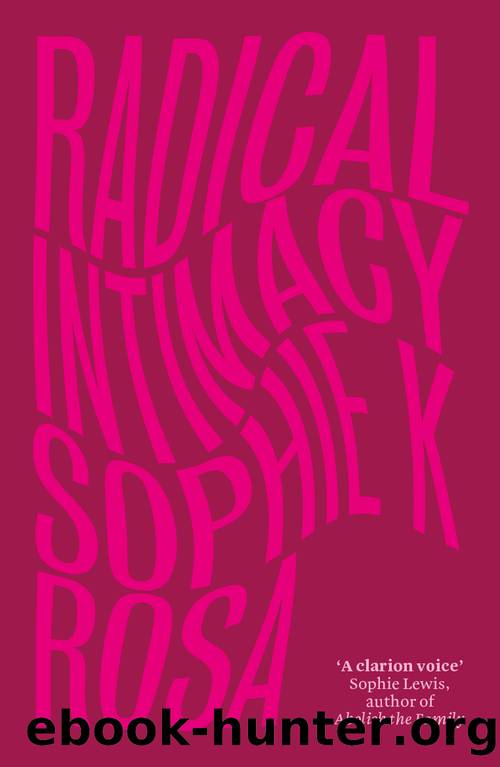Radical Intimacy by Sophie K Rosa

Author:Sophie K Rosa
Language: eng
Format: epub
Publisher: Pluto Press
Loyalty and forgiveness are two more âfamily valuesâ worth examining as we imagine and create kinship beyond the nuclear and biological. Whilst, at one end of the spectrum, families frequently reject queer offspring out of hand, at the other, they purport to be bastions of support âthrough thick and thinâ. What this often looks like in practice is brushing harm under the carpet. Because âfamily comes firstâ, because âweâre still family at the end of the dayâ, neglect, abuse and violence are often permitted within its ambit. The loyalty and forgiveness families sometimes show some members usually looks nothing like transformative justice; accountability is rare in cultures of domination and silence. Nevertheless, there may be a helpful granule, at least, in the nuclear familyâs false claim to unshakable devotion: the idea that no one is disposable.
In an abolitionist future, a care commune cannot be carceral; it cannot respond to harm with further harm through punishment and ejection. When people hurt each other â as all of us do â we must not turn away, but stand by the person who has been harmed and be led by their needs, whilst supporting the perpetrator to take responsibility, make efforts to repair, and change their behaviour.
The idea is that family is âbound by bloodâ. And whilst this principle is responsible for much agony, people who make biological babies often claim that from having progeny there springs hope. Having reproduced, parents recount discovering a new fervour for the future, or being instilled with a greater sense of stewardship over the planet. Could some sense of parental futurity extend outwards, beyond the genetic, to help give birth to a better world? If children are the future, how might making children differently reshape the future? Or, as the activist and scholar Loretta J. Ross asks: âHow do we get from a conservative definition of mothering as a biological destiny to mothering as a liberating practice that can thwart runaway capitalism?â37
In Revolutionary Mothering: Love on the Front Lines, independent scholar and activist Alexis Pauline Gumbs writes about mothering â âespecially the mothering of children in oppressed groups, and especially mothering to end war, to end capitalism, to end homophobia and to end patriarchyâ â as âa queer thingâ.38 Mothering might be a way to recreate the self and the world; or as Gumbs puts it, a way of âbreaking cycles of abuse by deciding what we want to replicate from the past and what we need urgently to transformâ.39
Resisting the forces of ecological disaster could indeed be spurred on by wanting a bright future for âyourâ child; but caring for the planet need not be â must not be â contingent upon having biological offspring. Many Indigenous cultures hold the responsibility of care for all life dear. Ecologies are not simply protected âso my kids can enjoy themâ, but for their own sake, and for the sake of all beings. In this understanding, ecologies are not protected so that extraction can continue for our kin, but because the land, the air, the water â they are our kin.
Download
This site does not store any files on its server. We only index and link to content provided by other sites. Please contact the content providers to delete copyright contents if any and email us, we'll remove relevant links or contents immediately.
Rewire Your Anxious Brain by Catherine M. Pittman(18656)
Talking to Strangers by Malcolm Gladwell(13371)
The Art of Thinking Clearly by Rolf Dobelli(10489)
Mindhunter: Inside the FBI's Elite Serial Crime Unit by John E. Douglas & Mark Olshaker(9344)
Becoming Supernatural by Dr. Joe Dispenza(8218)
Change Your Questions, Change Your Life by Marilee Adams(7783)
Nudge - Improving Decisions about Health, Wealth, and Happiness by Thaler Sunstein(7709)
The Road Less Traveled by M. Scott Peck(7603)
The Lost Art of Listening by Michael P. Nichols(7506)
Mastermind: How to Think Like Sherlock Holmes by Maria Konnikova(7347)
Enlightenment Now: The Case for Reason, Science, Humanism, and Progress by Steven Pinker(7314)
Win Bigly by Scott Adams(7199)
The Way of Zen by Alan W. Watts(6615)
Daring Greatly by Brene Brown(6514)
Big Magic: Creative Living Beyond Fear by Elizabeth Gilbert(5775)
Grit by Angela Duckworth(5615)
Ego Is the Enemy by Ryan Holiday(5451)
Men In Love by Nancy Friday(5240)
The Laws of Human Nature by Robert Greene(5209)
